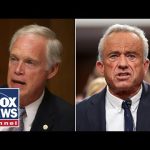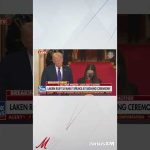In the theater of Washington politics, few names have sparked as much intrigue and provoked as much conversation recently as Robert F. Kennedy Jr. (RFK Jr.). The hearing room felt like a Hollywood affair last week, with Cheryl Hines, Kennedy’s wife, and star of a popular TV show, seated prominently among the attendants. It was as if the culture clash was being epitomized right there: the glitz and glam of Hollywood intersecting with the rugged, no-holds-barred world of politics. Kennedy, known for his maverick stances, unquestionably stirred up enthusiasm as notable as any celebrity, contrasting sharply with the buttoned-down vibe of some other political figures.
The energy Kennedy breathed into the room was palpable. Here was a man, once known for his environmental activism and anti-vaccine advocacy, now buoyed by supporters who refuse to be tethered by conventional political affiliations. The crowd broke out in applause whenever Kennedy defended his controversial yet unfaltering viewpoints, a stark reminder of the divide between political rhetoric and popular sentiment. The spectacle seemed to cause discomfort among his critics, particularly when the opposition chose to focus their energy on labeling him a conspiracy theorist and vaccine skeptic rather than engaging with the substance of his arguments.
Accountability is a powerful feeling, and Kennedy’s unapologetic stance seemed to exude it. During the hearings, he faced a barrage of attempts to discredit him by associating his policies with untested conspiracies, but Kennedy held his ground. When he was accused of misleading claims about vaccines and other issues, his response was both firm and methodical. He pointed out the inconvenient truths some of his critics denied or ignored, challenging them to find any supposed conspiracy theory he hadn’t already been validated on. This ability to withstand scrutiny while pointing out that numerous accusations against him had faltered under factual revision played in his favor.
The hearing was also a stark reminder of how entrenched certain narratives have become. Sessions erupted into exchanges when viewed as someone from outside the establishment challenging political orthodoxy. His critics, including members from both parties, insisted on painting him into a corner with convoluted questions meant to trip him up over bureaucratic complexities. They underestimated both his appeal and his ability to articulate a clear vision.
The hearing took place on January 29, 2025, and underscored a key theme: unity in diversity of opinion. Kennedy’s resilience in the hearings, despite evident partisan skirmishes, could be indicative of a broader sentiment among many Americans who feel disconnected from established narratives. As these deliberations continue, one hopes both sides can recognize the need for open, honest dialogue over mindless mudslinging. Bobby Kennedy Jr.’s conundrum is a mirror to a nation grappling with intricacies—how it addresses them could define its political landscape in the days to come.




